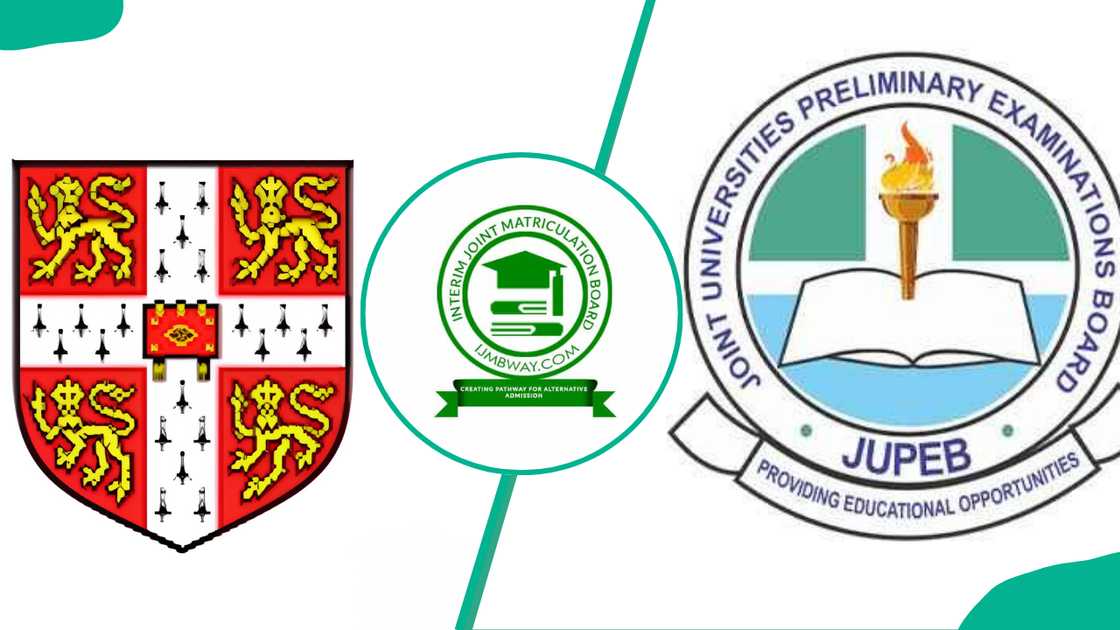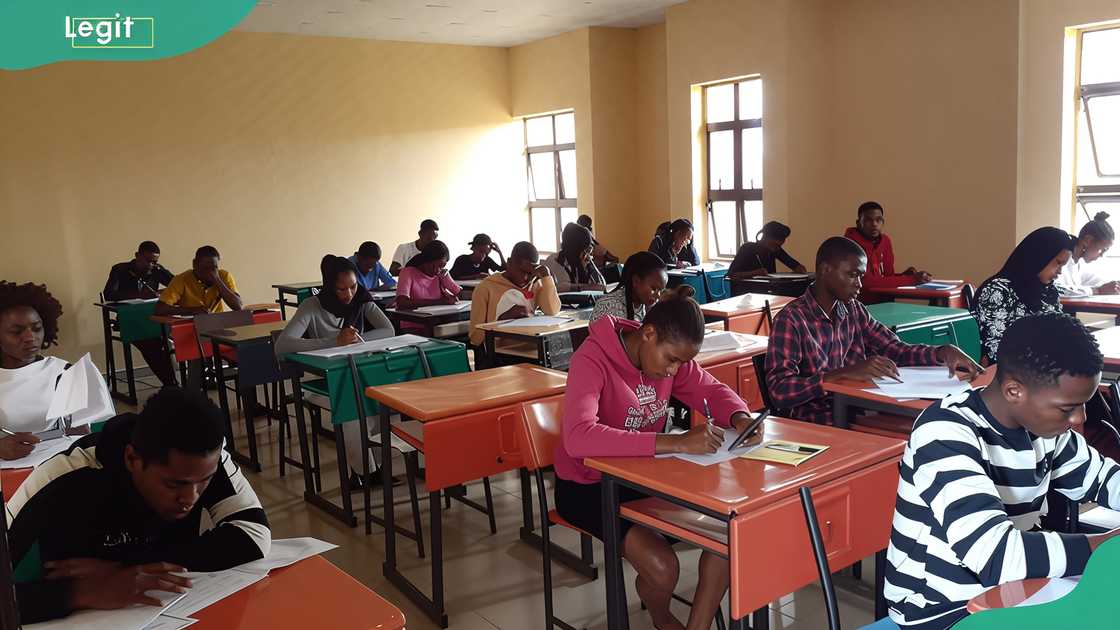What is an A-Level result in Nigeria? The education system explained
What is an A-Level result in Nigeria? An A-Level result reflects a student's performance in advanced examinations such as the Cambridge A-Levels, JUPEB, or the IJMB exams. These results provide a pathway from secondary school to university, allowing direct entry into higher institutions without taking the UTME.

Source: UGC
TABLE OF CONTENTS
- Key takeaways
- What is an A-Level result in Nigeria?
- How are A-Level results calculated?
- A-Levels grading system
- A-Level schools in Nigeria
- What is an A-level certificate in Nigeria?
- What is the A-level equivalent in Nigeria?
- What does an O-level result mean in Nigeria?
- What are the A-Level exams in Nigeria?
- Is WAEC A-Level?
Key takeaways
- A-Level exams are usually conducted through three main programs: Cambridge International A-Levels, Interim Joint Matriculation Board (IJMB), and Joint Universities Preliminary Examinations Board (JUPEB).
- The Cambridge International A-Levels are internationally recognised qualifications that usually take two years to complete.
- The IJMB program is a nine-month advanced-level course administered by Ahmadu Bello University, Zaria, in collaboration with affiliated study centres throughout Nigeria.
- The JUPEB program spans 9 to 12 months and is divided into two semesters.
What is an A-Level result in Nigeria?
In Nigeria, an "A-Level result" reflects a student's performance in advanced-level exams that bridge the gap between secondary school (SSCE/WAEC/NECO) and university. These results are useful for students seeking direct entry admission into 200-level Nigerian universities, while Cambridge International A-Level results are widely recognised for admission to universities abroad.
The main A-Level programs in Nigeria include Cambridge International A-Levels, IJMB, and JUPEB, which are explained in detail below.
1. Cambridge International A-Levels

Source: Facebook
Cambridge International A-Levels are advanced-level courses offered by Cambridge Assessment International Education. They typically last two years, often structured as AS Level in year one and A2 Level in year two. The courses span various subjects such as sciences, humanities, social sciences, and languages.
Cambridge International A-Levels entry requirements
Entry requirements for Cambridge International A-Levels may differ based on the country, institution, or specific programme. Below are the general requirements.
- Applicants should have completed Cambridge IGCSEs, O Levels, or an equivalent secondary education.
- Students are expected to choose A-Level subjects relevant to their intended field of study.
University admission with A-Level results
Admission to the University of Cambridge with A-Level results is highly competitive, requiring excellent grades and relevant subject choices. Below are the key requirements.
- Universities set their own grade and subject requirements for admission.
- Top-ranking universities, including the University of Cambridge, may require top grades (AAA or A*AA) and specific subject combinations for admission.
- Certain international universities, including those in the US and Canada, grant course credits to students with strong A-Level grades (A–C).
2. Interim Joint Matriculation Board (IJMB)

Source: Facebook
Established in 1976 by the Interim Common Services Agency (ICSA) and overseen by Ahmadu Bello University, Zaria, IJMB is an advanced program that lasts nine months. It provides an alternative route into Nigerian universities, enabling successful candidates to secure direct entry admission into the 200 level through JAMB.
3. Joint Universities Preliminary Examinations Board (JUPEB)
The Joint Universities Preliminary Examinations Board (JUPEB) was approved in 2013 and established in 2014 by ten universities, led by the University of Lagos (UNILAG). It offers a 9–12 month advanced program that also allows direct entry into the second year of Nigerian and select foreign university degree programs, bypassing the UTME.
IJMB /JUPEB subject selection and requirements
Choosing the right subjects for IJMB or JUPEB is essential to match your intended university course. Below are the subject requirements and combinations needed.
- Students usually choose three (3) A-Level subjects that match their intended university course, for instance, Physics, Chemistry, and Mathematics for Engineering, and Biology, Chemistry, and Physics for Medicine.
- Selecting the right subjects is essential, as universities require specific combinations for admission into certain degree programs.
- Passing all chosen subjects is mandatory to be eligible for Direct Entry into 200-level at Nigerian universities.
How are A-Level results calculated?
Results from advanced-level programs: Cambridge A-Levels, IJMB, and JUPEB, are determined through exams, coursework, and practical assessments. Here’s how results are calculated.

Source: Facebook
Cambridge A-Level results
Cambridge A-Level grades are based on a mix of assessments, including exams, coursework, and practicals, depending on the subject.
- AS Level (Year 1): Introduces core topics, with exams contributing to the final grade.
- A2 Level (Year 2): Covers advanced topics; A2 exams combined with AS results determine the overall grade.
- Final Grade: AS and A2 marks are weighted according to the subject and converted into a letter grade ranging from A* (highest) to E (minimum pass).
Note: Failing either AS or A2 can prevent a final grade, and coursework or practicals may significantly impact the outcome.
IJMB /JUPEB results
Students are mainly assessed through end-of-programme examinations in each subject. Some centres also incorporate continuous assessments, such as assignments, quizzes, or tests, which contribute to the final grade.
A-Levels grading system
A-Levels grades indicate a student’s preparedness for university and are considered for admission into competitive programs.

Source: Facebook
Cambridge International A-Levels grading system
Cambridge International A-Level grades range from A*, the highest, to E, the minimum passing grade. Candidates who do not achieve a grade E or higher receive the result ‘Ungraded’ (U).
Grades are awarded based on a combination of assessment components, with no plus or minus distinctions. At the AS Level, grades also range from A to E, with A* not available at this level.
AS Level grading system
AS Level grade | PUM range |
a | 80–100 |
b | 70–79 |
c | 60–69 |
d | 50–59 |
e | 40–49 |
A-Level grading
A Level grade | PUM range |
A* | 90–100 |
A | 80–89 |
B | 70–79 |
C | 60–69 |
D | 50–59 |
E | 40–49 |
IJMB/JUPEB grading system
The programmes use a credit/pass-based grading scale:
- Distinction: excellent, needed for competitive courses.
- Credit: good, meets most Direct Entry requirements.
- Pass: satisfactory, usually qualifies for Direct Entry.
- Fail: does not qualify for Direct Entry.
IJMB A-Level grading system
The table below shows the IJMB A-Level grading system, detailing the mark ranges, grade interpretations, and corresponding grade points awarded for each level of performance.
Grade | Mark range | Interpretation | Grade points |
A | 70+ | Excellent | 5 |
B | 60–69 | V. Good | 4 |
C | 50–59 | Good | 3 |
D | 45–49 | Merit | 2 |
E | 40–44 | Pass | 1 |
F | 0–39 | Fail | 0 |
Note: Earning higher grades, such as Distinction or Credit, improves the likelihood of gaining admission into competitive courses like Medicine, Engineering, or Law.
A-Level schools in Nigeria
Nigeria has several schools offering A-Level programs that prepare students for local and international university admission. These schools emphasise academic excellence and a variety of subject choices. Some of these schools include:
- Westerfield College – Lagos, Abuja, Kano, UK
- Bridge House College – Lagos
- Lagos Cambridge School – Lagos
- Edgewood College – Lagos
- Children’s International School (CIS), Lekki

Source: Facebook
- Greensprings School – Lagos
- British International School (BIS) – Lagos
- The Regent (Regent College / Regent Secondary) – Abuja
- Lifeforte International Schools – Ibadan
- St. Catherine’s A’ Levels School – Lagos
- Whiteplains British School – Abuja
- Cambridge College, Ikeja – Lagos
- Afe Babalola International Study Centre (ABISC) – Ibadan
What is an A-level certificate in Nigeria?
An A-Level certificate in Nigeria is a pre-university qualification awarded upon successful completion of an advanced-level program, such as Cambridge International A-Levels, IJMB, or JUPEB.
What is the A-level equivalent in Nigeria?
In Nigeria, A-Level equivalents are mainly the IJMB or JUPEB programmes, while WAEC/WASSCE is closer to GCSEs.
What does an O-level result mean in Nigeria?
In Nigeria, an O-Level result reflects a student's performance in final secondary school examinations, like the WASSCE or GCE O-Level, taken at the end of senior secondary school. These results are crucial for advancing to A-Level programs, universities, or other tertiary education pathways.

Source: Facebook
What are the A-Level exams in Nigeria?
A-Level exams in Nigeria are post-secondary assessments, offered through programs like Cambridge A-Levels, IJMB, and JUPEB. Students study 2–4 subjects, and passing qualifies them for direct entry into 200-level at Nigerian universities, with recognition locally and abroad.
Is WAEC A-Level?
WAEC is not an A-Level qualification; it is an O-Level exam taken at the completion of secondary school.
In Nigeria, an A-Level result reflects a student’s performance in advanced-level examinations designed to prepare them for university studies. These qualifications are recognised for Direct Entry admission into 200-level degree programs in Nigerian universities, while Cambridge A-Levels are widely accepted by universities abroad.
Legit.ng recently published an article on the list of schools that accept students with awaiting results. JAMB allows you to register with an awaiting result and later update your result once available.
Many Nigerian universities accept applications with awaiting results. This gives candidates whose WAEC, NECO, or NABTEB results have not yet been released a fair chance to take part in the UTME and Post-UTME processes.
Proofreading by Kola Muhammed, copy editor at Legit.ng.
Source: Legit.ng








